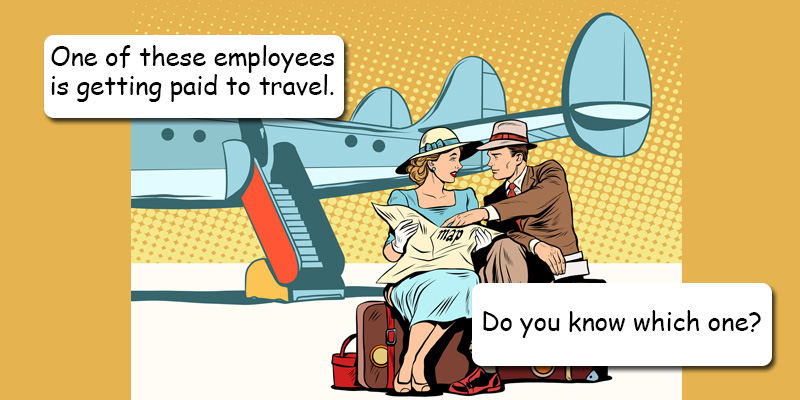There are many times when an employee may need to travel for business-related purposes. The latter span can include something brief, like a trip to the bank, or a cross-country flight for a business conference and depending upon the circumstances, it can be compensable time. I think the best way to tackle this is to take a look at examples as to what is and what is not:
What is NOT compensable
Home to work/Work to home (aka commuting) – An employee who travels from home before the regular workday and returns to his/her home at the end of the workday is engaged in ordinary home-to-work travel. If the employee has different job sites, then the home-to-work commences when the employee arrives to their first job site and ends when the employee leaves their final job site. This is true even if the employee drives a company vehicle.
Travel that requires an overnight stay outside of regular working hours – An employee who will be away from home for at least one night and the time spent in travel is outside of their regular working hours. Please note that this scenario is in relation to working hours; the day of the week is meaningless. For example, if I work Monday to Friday from 9am to 5pm and I travel on Saturday night from 6pm to 8pm, that travel time is not compensable.
What IS compensable
Travel that is all in a day’s work – The time spent by an employee in travel as part of their principal activity. This would include travel between worksites or a trip to the bank to make a deposit. Another example would be if the employee is making a stop at the post office to drop off the mail on their way home at the end of the day. The employee would be compensated until their work was done at the post office while their drive home from the post office falls under non-compensable.
Home to work on a special one-day assignment in another city – An employee who regularly works at a primary location in one city is given a special one-day assignment in another city and returns home the same day. The time spent in traveling to and returning from the other city is work time, except that the employer may reduce the travel time that the employee would normally spend commuting to their primary location.
Travel that requires an overnight stay during regular working hours – An employee who will be away from home for at least one night and the time spent in travel is during their regular working hours regardless of whether it is during a non-working day. Let’s say the employee works from 9am to 5pm Monday to Friday and the employee travels from 3pm to 8pm on a Sunday. The time from 3pm to 5pm is compensable and from 5pm to 8pm is not.
Working while traveling – An employee must be paid for any time they are performing work. Let’s say the flight took place from 4pm to 7pm and during the flight, emails were responded to and documents were edited. The employee would be compensated for those outside of their regular work hours of 5pm to 7pm.
Driving for work – An employee who is requested by their employer to drive. An example is an employee who is required to drive to another city for a conference located outside of their regular working hours in order to transport boxes or even drive another employee.
While on the subject of travel, another common question is whether sleeping time is compensable. If the employee is required to be on duty for less than 24 hours straight, then they are considered working, even though they are permitted to sleep or engage in other personal activities when not busy. An employee required to be on duty for 24 hours or more may agree with the employer to exclude from hours worked bonafide regularly scheduled sleeping periods of not more than 8 hours. There must be adequate sleeping facilities and the employee can usually enjoy an uninterrupted night’s sleep of at least 5 hours.
As we have read in the above examples, there are more cases of travel time being compensable, so when in doubt, it may be safe to pay. A final note: If travel time is compensable, then those hours are counted towards the 40 hour work week for determining overtime. As with any law, check your state and local regulations to be sure they do not differ from the FLSA.
While I make every attempt to ensure the accuracy and reliability of the information provided in this article, the information is provided “as-is” without warranty of any kind. PayMaster, Inc or Romeo Chicco does not accept any responsibility or liability for the accuracy, content, completeness, legality, or reliability of the information contained. Consult with your CPA, Attorney, and/or HR Professional as federal, state, and local laws change frequently.


[…] While on the subject of travel, another common question is whether sleeping time is compensable. If the employee is required to be on duty for less than 24 hours straight, then they are considered working, even though they are permitted to sleep or engage in other personal activities when not busy. […]